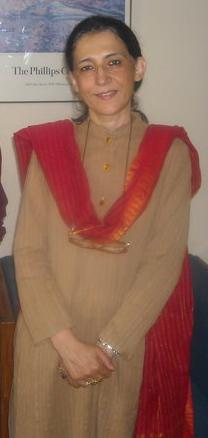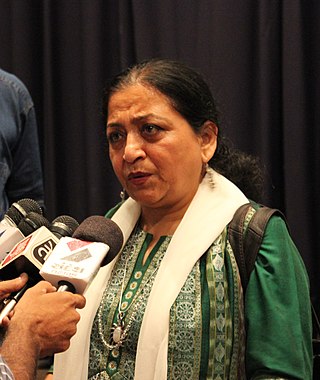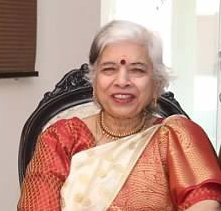Related Research Articles

Ayesha Jalal is a Pakistani-American historian who serves as the Mary Richardson Professor of History at Tufts University, and was the recipient of the 1998 MacArthur Foundation Fellowship.
Asma Barlas is a Pakistani-American writer and academic. Her specialties include comparative and international politics, Islam and Qur'anic hermeneutics, and women's studies.

Devaki Jain is an Indian economist and writer, who has worked mainly in the field of feminist economics. In 2006 she was awarded the Padma Bhushan, the third-highest civilian award from Government of India, for her contribution to social justice and the empowerment of women.
Transnational feminism refers to both a contemporary feminist paradigm and the corresponding activist movement. Both the theories and activist practices are concerned with how globalization and capitalism affect people across nations, races, genders, classes, and sexualities. This movement asks to critique the ideologies of traditional white, classist, western models of feminist practices from an intersectional approach and how these connect with labor, theoretical applications, and analytical practice on a geopolitical scale.

Madhu Purnima Kishwar is an Indian academic and a commentator. She is currently employed as a chair Professor in the Indian Council of Social Science Research. Kishwar along with fellow-academic Ruth Vanita co-founded the journal Manushi.

Swapan Dasgupta is an Indian journalist and politician. He is influential within the Indian right wing, writing columns for leading English dailies espousing Indian nationalism. He is a nominated member of the Rajya Sabha. In 2015, Dasgupta was conferred with the Padma Bhushan for his contribution to literature and education.

Gail Omvedt was an American-born Indian sociologist and human rights activist. She was a prolific writer and published numerous books on the anti-caste movement, Dalit politics, and women's struggles in India. Omvedt was involved in Dalit and anti-caste movements, environmental, farmers' and women's movements, especially with rural women.

Feminism in India is a set of movements aimed at defining, establishing, and defending equal political, economic, and social rights and opportunities for women in India. It is the pursuit of women's rights within the society of India. Like their feminist counterparts all over the world, feminists in India seek gender equality: the right to work for equal wages, the right to equal access to health and education, and equal political rights. Indian feminists also have fought against culture-specific issues within India's patriarchal society, such as inheritance laws.
Global feminism is a feminist theory closely aligned with post-colonial theory and postcolonial feminism. It concerns itself primarily with the forward movement of women's rights on a global scale. Using different historical lenses from the legacy of colonialism, global feminists adopt global causes and start movements which seek to dismantle what they argue are the currently predominant structures of global patriarchy. Global feminism is also known as world feminism and international feminism.

Sadhvi Nisha Rithambara is a Hindu nationalist ideologue and the founder-chairperson of Durga Vahini.
Shirin M. Rai, is an interdisciplinary scholar who works across the political science and international relations boundaries. She is known for her research on the intersections between international political economy, globalisation, post-colonial governance, institutions and processes of democratisation and gender regimes. She was a professor of politics and international studies at the University of Warwick, and is the founding director of Warwick Interdisciplinary Research Centre for International Development (WICID).

Martha Chen is an American academic, scholar and social worker, who is presently a lecturer in public policy at the Harvard Kennedy School and senior advisor of the global research-policy-action network WIEGO and a member of the Advisory Board of the United Nations University World Institute for Development Economics Research (UNU-WIDER). Martha is a development practitioner and scholar who has worked with the working poor in India, South Asia, and around the world. Her areas of specialization are employment, poverty alleviation, informal economy, and gender. She lived in Bangladesh working with BRAC, one of the world's largest non-governmental organizations, and in India, as field representative of Oxfam America for India and Bangladesh for 15 years.

Nivedita Menon is a writer and a professor of political thought at Jawaharlal Nehru University, Delhi. She previously taught at Lady Shri Ram College and the Department of Political Science at Delhi University.
Richa Nagar is a scholar, creative writer, educator, and theatre-worker who is Professor of the College in the College of Liberal Arts at the University of Minnesota. Nagar's creative and scholarly work makes multi-lingual and multi-genre contributions to transnational feminism, social geography, critical development studies, and critical ethnography. Her research has encompassed a range of topics including: politics of space, identity and community among communities of South Asian origin in Tanzania; questions of empowerment in relation to grass-roots struggles in the global South, principally with the Sangtin Kisan Mazdoor Sangathan (SKMS) in Sitapur District, India; the politics of language and social fracturing in the context of development and neo-liberal globalization; and creative praxis that uses collaboration, co-authorship, and translation to blur the borders between academic, activist, and artistic labor. She has held residential fellowships at the Center for Advanced Study in the Behavioral Sciences (CASBS) at Stanford in 2005-2006, at the Jawaharlal Nehru Institute of Advanced Study (JNIAS) at New Delhi in 2011-2012, and at the Centre for Humanities Research at the University of the Western Cape in 2013. She was named Honorary Professor at the Unit for Humanities at the Rhodes University (UHURU) at Rhodes University in South Africa in 2017, and her work has been translated into several languages including Turkish, Marathi, Italian, German and Mandarin.
Ratna Kapur is a law professor and former director of the Center for Feminist Legal Research in New Delhi, India [1995–2012].

Tejaswini Niranjana is an Indian professor, cultural theorist, translator and author. She is best known for her contribution to the fields of culture studies, gender studies, translation, and ethnomusicology. She is the daughter of Kannada playwright and novelist Niranjana and writer Anupama Niranjana. Her partner is Indian author and cultural theorist, Ashish Rajadhyaksha.

Rekha Pande is a professor of history and women's studies. She is a Professor Emeritus at the Henry Martin Institute, an International Centre for Research, Interfaith Relations and Reconciliation, Hyderabad. She is also currently the Director of the Society for Empowerment through Environment Development (SEED). She is the former Head of the Centre for Women's Studies and the former Head of the Department of History at the University of Hyderabad, India. She has also served as a Director Centre for Women's Studies at Maulana Azad National Urdu University (MANUU), Hyderabad. She is a well-known and well-published scholar in the interdisciplinary areas of history and women's studies. She is an established academician in the field of international studies, women's history, and gender studies. As a feminist historian, she has been concerned with the theoretical and methodological problems of reconstructing women's history and understanding the historical roots of women's subordination in the South Asian context. She also attempts to examine the varied historical contexts at the regional/local levels and explain the reproduction and subordination of women at the national and global scale—in various related, albeit different, contemporary contexts. She is an academic activist also associated with the women's movement in India.

Shareefa Hamid Ali, also known as Begum Hamid Ali, was an Indian feminist, nationalist, advocate, and political figure. She was the President of the All India Women's Conference in 1935, and one of the founding members of the United Nations Commission on the Status of Women in 1947.
Scholarship on nationalism and gender explores the processes by which gender affects and is impacted by the development of nationalism. Sometimes referred to as "gendered nationalism," gender and nationalism describes the phenomena whereby conceptions of the state or nation, including notions of citizenship, sovereignty, or national identity contribute to or arise in relation to gender roles.
Raka Ray is an American sociologist and academic. She is a full-time professor at the University of California, Berkeley in the departments of Sociology and Southeast Asian Studies. She became the Dean of Social Sciences at UC-Berkeley in January 2020. Ray's research interests include gender and feminist theory, postcolonial sociology, emerging middle classes, South Asia, inequality, qualitative research methods, and social movements. Her current project explores changes in the meanings and relations of servitude in India. Ray is also an editor of the publication Feminist Studies.
References
- 1 2 "Amrita Basu: Then and Now". Amherst. 24 March 2017.
- ↑ Amherst College website; https://www.amherst.edu/people/facstaff/abasu
- ↑ Whittemore, Katherine. "A Woman's Work Is Never Done". Amherst.edu.
- 1 2 3 4 5 6 Curriculum Vita. "Amrita Basu" (PDF). Asian American.
- ↑ "Faculty & Staff - Basu, Amrita - Amherst College". www.amherst.edu. Retrieved 2019-07-18.
- ↑ "Committee Nominates 2014–15 Officers and Council Members". PS: Political Science & Politics. 47 (3): 743–750. 19 June 2014. doi: 10.1017/S1049096514000985 . ISSN 1049-0965.
- 1 2 3 "Amrita Basu". www.press.uchicago.edu. Retrieved 2019-07-18.